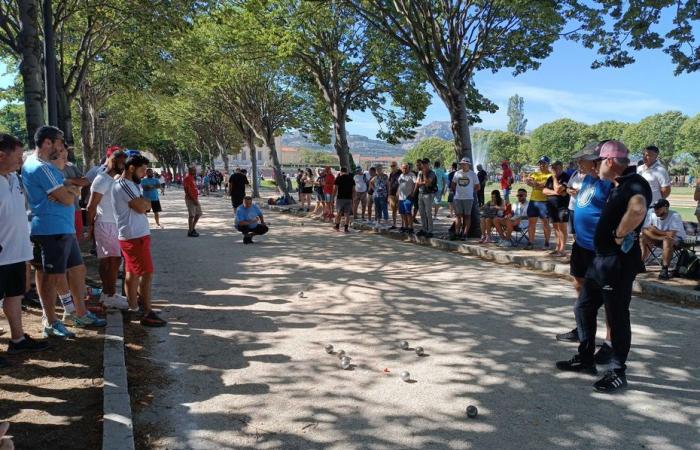Written by Pauline Sauthier
Dylan Rocher, Philippe Quintais, Marc Tierno… They agreed to talk about a taboo subject at the World Cup La Marseillaise à pétanque: the “payers”, otherwise known as “sponsors” or “partners”. Understand: those who pay to play in a trio of professionals.
Everyone talks about it, but no one does it openly. Along the grounds at La Marseille à pétanque, it is not uncommon to hear comments from the public about a player: “He is the payer.” In other words, the one who paid to be part of a triplet which includes two big names in pétanque. What follows are whispered conversations, between fascination and criticism, speculation and reality.
“It’s 1000 euros plus interest: with the restaurant, the bar, the players pay nothing,” “slips an amateur, who is watching a first round match, where an important team is playing.”“You’re crazy,” a friend said, “it’s more like 5,000 or 10,000 euros!”
The journalist who asks about the subject receives, at best, an embarrassed laugh, at worst, silence. It must be said that the term “payer” seems pejorative. The pros prefer to speak of “sponsor” or “partner”.
Philippe Quintais, fourteen times world champion, is one of them. “There are people who spend a lot of money at the casino, others who spend a lot of money at the tiercé… And there are those who like to play pétanque and who, in order to be able to play at a high level, finance big players.”
He is not in favor of this practice in competitions “for the champions, for the elites”, but for the rest of the championships, the practice does not pose a problem for him.
We have the chance, from time to time, to play with people for their birthday, for a retirement. For them it’s very flattering, it makes them happy. But it’s misunderstood by the public.
Philippe Quintais, pétanque championto France 3 Provence-Alpes
Also used to medals, Dylan Rocher, four times winner of the World Cup, three times world champion and seven times French champion, understands the practice, even if he does not wish to adopt it.
“Is even thinks it is a chance for the ‘partners’, he assures. Because in other sports you can’t do it. I would like to play a tennis match with Federer or Nadal. Well, even if I give 1,000,000 euros, I don’t think it’s possible.”
The underlying issue is the economics of professional pétanque. “When players have 30 or 40 years of pétanque under their belt, that they play at a high level, I understand that they can try to play with someone who will at least pay their travel, hotel and meal expenses, explains Dylan Rocher. They go away for four or five days without seeing their family. They want it to cost them a minimum or nothing at all. If they can earn a little extra money, that’s even better.”
>>Broadcast of the Marseillaise à pétanque 2024: at what time and where to watch the games of the day live and in replay?
In a competition like La Marseillaise, the winners earn 6,000 euros to be shared between three, after four days of competition. The finalists, 3,000 euros. Registration for the tournament costs 8 to 9 euros. But with the additional costs (travel, accommodation, etc.) most of the 12,000 players are in deficit.
We must ask ourselves the right question: why do champions play with ‘partners’? Because there is nothing to win in pétanque, in competitions.
Dylan Rocherto France 3 Provence-Alpes
Rocher and Quintais work alongside their professional bowling careers. The former works for the Valence-Romans urban community, the latter has a textile company. Philippe Quintais, like Dylan Rocher, wears a jersey with more official sponsors. According to Quintais, this is not enough to take part in all the competitions.
“You have to know that we have no insurance, develops the 56-year-old player. If tomorrow we have a car accident or break our arm, we have nothing that will allow us to live, so we absolutely have to have something on the side.”
The amounts mentioned by spectators about the “payers” are, according to him, very exaggerated. If he is “annoyed” by the question of money –“It’s like asking you for your salary”-, he agrees to answer: “Usually it’s around 1,000 euros for the four days. And the sponsor doesn’t take his personal winnings from the competition.”
“Payers” are often criticized by amateurs. They are the ones they blame for a bad game or a failure in competition. They are not supposed to be at the level of their triplet partners.
Pierre Guille, delegated president of the World Cup, dismisses this preconceived idea. “Actually, there are two types of ‘payers’ in pétanque. There is the player payer, someone who pays a pro to play with. In general, he is put in a pointer position, with very great players. And there is the ‘payer’ who pays a team to play… and who does not play.”
Guarantor of the quality of the competition, he has not “really agree” on the issue. While the names of those who pay, or are paid, are passed on quietly among insiders, he speaks openly about it. “There are ‘payers’ who are good players and we have known some who have even reached the World Cup final. I am thinking of Mr Godard, who is a foie gras producer in the South-West, and who speaks openly about it.”
Some players have revealed themselves alongside the greatest. “I think of Marc Tierno, who is a very good player, but who at the beginning was more or less a ‘payer’.”
To ensure the quality of his games, Philippe Quintais only plays with friends. “There are some ‘sponsors’ who are not my friends. It’s not about money. I won’t play with them, because they’re not in my mentality. When I play with friends, who are lucky enough to have money, it makes for a good weekend. At least you know you’re not losing money.”
Marc Tierno, mentioned by Pierre Guille, played the Marseillaise alongside Quintais and Suchaud in 2022. He distinguished himself this year with Joseph “Tyson” Molinas and Sébastien Rousseau during very popular games. Molinas comes from Lyon to play in the World Cup. Rousseau, from Indre-et-Loire, with the expenses that this entails. Tierno is from Marseille. He does not openly present himself as “payer” or “former payer”. But he agrees to discuss what he calls the “sponsors” : “ÇThis allows us to bring great players to the Marseillaise.”






